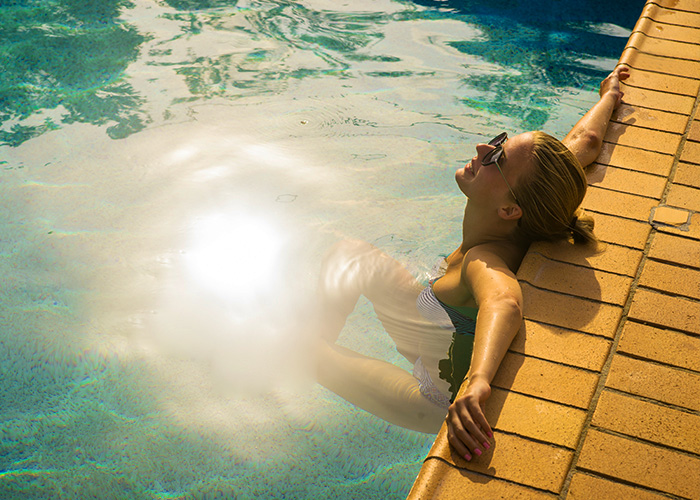The ultimate luxury: Heated swimming pool
Heat your swimming pool to create the perfect chill-zone this summer.
We have the best weather, that’s just a fact.
We are blessed in Mzansi with near constant sunshine. While this is great, it also means that our summer can get pretty hot. There is no denying it: A swimming pool can be the best escape from a stifling heatwave, offering you immediate refreshment. The problem comes in when that pool is icy (in contrast with the outside air). A refreshing dip in a cool pool is wonderful. A bone chilling, teeth chattering splash, on the other hand, isn’t lekker at all.
As hot as that heatwave might be, our human nature is still to shy away from uncomfortably cold water. Luckily the very sunshine that creates the heatwave can be harnessed to mellow out the icy water and create the perfect relaxing, refreshing and most importantly, inviting swimming experience.
Solar swimming pool water heating systems are efficient and effective.
South Africa is the world’s sixth largest swimming pool market, with upwards of 20% of residential homes having a swimming pool. Compared to the USA, with only 8% of households having swimming pools, it’s obvious to see that we like a good goef. We just don’t like them frosty.
Let the sun do the heavy lifting.
By far the most popular and widely used swimming pool heating system is the solar heating system. This system consists of “solar panels” of covered coiled piping connected with your existing pool filtration system. As the pool pump runs and the water gets filtered in the normal fashion, it is also pumped through the heating panels. As long as the sun is shining sufficiently and heating the “panel”, the water flowing back into the pool will be significantly warmer than the rest.
A few consecutive cycles of this, and with enough sunlight, your pool will be deliciously toasty in ’n jiffy. This system is affordable to install, and easily maintained. It is also extremely cost effective, seeing as it uses the energy of the sun to do the heating. The only cost might be a slight electricity increase because your swimming pool pump now has to pump the water further than before.
Wind chill factor
Many people aren’t aware that wind is one of the main culprits for stealing your pool’s heat. Installing windbreaks or planting a hedge can be a great way to avoid losing extra heat from your pool. Important though don’t obscure the view from your house, patio or outdoor entertainment area, as this can be a serious safety risk – especially if you have kids.
Other options: Heat pump pool heating
According to Little Wonder Pools,
“Heat pumps are an energy efficient electric powered hot water solution for on-demand, and in some situations, continuous heating scenarios. Heat pumps are the same technology behind reverse cycle air conditioning. They work by cycling a refrigerant through two coils at differing pressures to extract heat from one place and release it in another.
Through this mechanism, heat can be extracted from air that is cooler than your pool by using the pressure difference to make the refrigerant cooler than the air passing around it, causing the refrigerant to absorb heat. The refrigerant is then pressurised by a pressure pump, causing its temperature to rise so when it comes into contact with colder water, this heat passes into it.”
The ongoing costs of heat pumps are related to powering the pressure pump rather than a direct heating mechanism. In short – Its not a large sale geyser and therefor still cheaper to run.
Temperature control pool cover
There are many options of pool covers. While some are specialized safety covers, others specialize in increasing and then maintaining your pool’s water temperature. TAKE NOTE: These pool covers are not inherently safety covers and you should always ensure that you have a multi-layered approach to pool safety in place. For more advice on pool safety, read the Homemakers Pool Safety Weekly Fix.
What temperature is optimal?
For most people a comfortable, relaxing “cool” swim happens the water temperature is 26̊C or warmer. This means that it is likely you’ll have to heat your pool a little bit for most of the swimming season.
It’s up to you which heating option you choose, but one thing is sure: A pool at home is a joy, (if you read and follow this Homemakers Pool Care guide), but a heated pool at home is even better.



